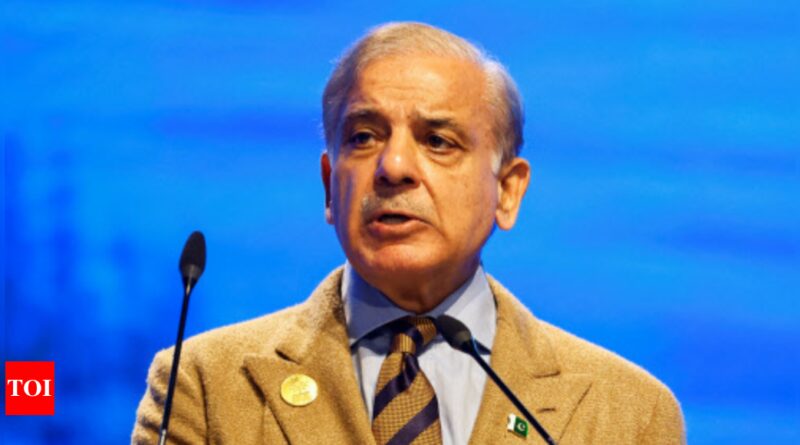Pakistan: Pakistan PM Sharif, minister Hina Khar’s discussion on US-China tussle leaked: Report – Times of India
ISLAMABAD: US intelligence documents have been leaked on the Discord messaging platform revealing conversations between Pakistan Prime Minister Shehbaz Sharif and his junior Foreign Minister Hina Rabbani Khar on the foreign policy matters, according to a media report on Sunday.
In one internal memo titled ‘Pakistan’s Difficult Choices’, parts of which were published by the Washington Post on Sunday, Khar cautions that Pakistan should avoid giving the impression of “appeasing” the West, The Express Tribune newspaper reported.
She warns that the country can no longer attempt to maintain a middle ground between regional neighbour China and the US.
In the memo, Khar argues that preserving Pakistan’s partnership with the US would ultimately sacrifice the full benefits of its “real strategic” partnership with China.
The undated document does not specify how the US obtained access to Khar’s memo, a report published by the Washington Post revealed.
The leak of US intelligence documents, posted largely on social media websites, was believed to be the most serious security breach since more than 700,000 documents, videos, and diplomatic cables appeared on the WikiLeaks website in 2010.
The episode embarrassed the US by revealing its spying on allies, including Pakistan, and the purported military vulnerabilities of Ukraine.
The leaked documents provide a rare glimpse into the private calculations made by influential regional powers such as India, Brazil, Pakistan, and Egypt.
The documents also offer new insights into the obstacles that the Biden administration faces in securing global support for its efforts.
Another leaked document related to Pakistan dated February 17 describes Prime Minister Sharif’s deliberations with an unnamed subordinate about an upcoming UN vote on the Ukraine conflict.
The document says that an aide advised Sharif that support for the measure would signal a shift in Pakistan’s position, jeopardising its ability to negotiate trade and energy deals with Russia.
Pakistan was among the 32 countries that abstained when the UN General Assembly vote took place on February 23.
The Post report further said that Pakistani officials as well as those from other countries named in the leaked documents declined to comment.
The story emerges at a time when Washington has already confirmed that it has no objections to Pakistan’s decision to import oil from Moscow.
“Each country will make its own sovereign decisions regarding its energy supply,” US State Department spokesperson Vedant Patel said during a weekly briefing.
According to the Express Tribune newspaper, Matias Spektor, a scholar at the Carnegie Endowment for International Peace, said developing nations are recalibrating their positions as America faces potent new competition from China and Russia.
“It’s unclear who will end up in a pole position in 10 years’ time, so they need to diversify their risk and hedge their bets,” Spektor told the Post.
In one internal memo titled ‘Pakistan’s Difficult Choices’, parts of which were published by the Washington Post on Sunday, Khar cautions that Pakistan should avoid giving the impression of “appeasing” the West, The Express Tribune newspaper reported.
She warns that the country can no longer attempt to maintain a middle ground between regional neighbour China and the US.
In the memo, Khar argues that preserving Pakistan’s partnership with the US would ultimately sacrifice the full benefits of its “real strategic” partnership with China.
The undated document does not specify how the US obtained access to Khar’s memo, a report published by the Washington Post revealed.
The leak of US intelligence documents, posted largely on social media websites, was believed to be the most serious security breach since more than 700,000 documents, videos, and diplomatic cables appeared on the WikiLeaks website in 2010.
The episode embarrassed the US by revealing its spying on allies, including Pakistan, and the purported military vulnerabilities of Ukraine.
The leaked documents provide a rare glimpse into the private calculations made by influential regional powers such as India, Brazil, Pakistan, and Egypt.
The documents also offer new insights into the obstacles that the Biden administration faces in securing global support for its efforts.
Another leaked document related to Pakistan dated February 17 describes Prime Minister Sharif’s deliberations with an unnamed subordinate about an upcoming UN vote on the Ukraine conflict.
The document says that an aide advised Sharif that support for the measure would signal a shift in Pakistan’s position, jeopardising its ability to negotiate trade and energy deals with Russia.
Pakistan was among the 32 countries that abstained when the UN General Assembly vote took place on February 23.
The Post report further said that Pakistani officials as well as those from other countries named in the leaked documents declined to comment.
The story emerges at a time when Washington has already confirmed that it has no objections to Pakistan’s decision to import oil from Moscow.
“Each country will make its own sovereign decisions regarding its energy supply,” US State Department spokesperson Vedant Patel said during a weekly briefing.
According to the Express Tribune newspaper, Matias Spektor, a scholar at the Carnegie Endowment for International Peace, said developing nations are recalibrating their positions as America faces potent new competition from China and Russia.
“It’s unclear who will end up in a pole position in 10 years’ time, so they need to diversify their risk and hedge their bets,” Spektor told the Post.




